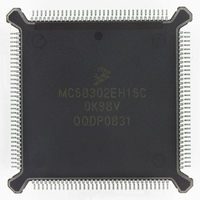MC68302EH16C Freescale Semiconductor, MC68302EH16C Datasheet - Page 64

MC68302EH16C
Manufacturer Part Number
MC68302EH16C
Description
IC MPU MULTI-PROTOCOL 132-PQFP
Manufacturer
Freescale Semiconductor
Datasheets
1.MC68302AG20C.pdf
(4 pages)
2.MC68302AG20C.pdf
(2 pages)
3.MC68302AG20C.pdf
(13 pages)
4.MC68302EH16C.pdf
(481 pages)
Specifications of MC68302EH16C
Processor Type
M683xx 32-Bit
Speed
16MHz
Voltage
5V
Mounting Type
Surface Mount
Package / Case
132-MQFP, 132-PQFP
Controller Family/series
68K
Core Size
32 Bit
Ram Memory Size
1152Byte
Cpu Speed
16MHz
No. Of Timers
3
Embedded Interface Type
SCP, TDM
Digital Ic Case Style
PQFP
Rohs Compliant
Yes
Family Name
M68000
Device Core
ColdFire
Device Core Size
32b
Frequency (max)
16MHz
Instruction Set Architecture
RISC
Supply Voltage 1 (typ)
5V
Operating Temp Range
0C to 70C
Operating Temperature Classification
Commercial
Mounting
Surface Mount
Pin Count
132
Package Type
PQFP
Lead Free Status / RoHS Status
Lead free / RoHS Compliant
Features
-
Lead Free Status / Rohs Status
RoHS Compliant part
Electrostatic Device
Available stocks
Company
Part Number
Manufacturer
Quantity
Price
Company:
Part Number:
MC68302EH16C
Manufacturer:
Freescale Semiconductor
Quantity:
135
Company:
Part Number:
MC68302EH16C
Manufacturer:
PANA
Quantity:
99
Company:
Part Number:
MC68302EH16C
Manufacturer:
Freescale Semiconductor
Quantity:
10 000
Part Number:
MC68302EH16C
Manufacturer:
FREESCALE
Quantity:
20 000
Company:
Part Number:
MC68302EH16CB1
Manufacturer:
Freescale Semiconductor
Quantity:
10 000
Company:
Part Number:
MC68302EH16CR2
Manufacturer:
Freescale Semiconductor
Quantity:
10 000
- MC68302AG20C PDF datasheet
- MC68302AG20C PDF datasheet #2
- MC68302AG20C PDF datasheet #3
- MC68302EH16C PDF datasheet #4
- Current page: 64 of 481
- Download datasheet (2Mb)
System Integration Block (SIB)
3.1.6 DMA Bus Arbitration
The IDMA controller uses the M68000 bus arbitration protocol to request bus mastership be-
fore entering the DMA mode of operation. The six SDMA channels have priority over the
IDMA and can transfer data between any two IDMA bus cycles with BGACK remaining con-
tinuously low. Once the processor has initialized and started a DMA channel, an operand
transfer request is made pending by either an external device or by using an internal re-
quest.
When the IDMA channel has an operand transfer request pending and BCLR is not assert-
ed, the IDMA will request bus mastership from the internal bus arbiter using the internal sig-
nal IDBR (see Figure 3-12). The arbiter will assert the internal M68000 core bus request
(CBR) signal and will monitor the core bus grant (CBG) and external BR to determine when
it may grant the IDMA mastership. The IDMA will monitor the address strobe (AS), HALT,
bus error (BERR), and bus grant acknowledge (BGACK) signals. These signals must be ne-
gated to indicate that the previous bus cycle has completed and the previous bus master
has released the bus. When these conditions are met, the IDMA only asserts BGACK to in-
dicate that it has taken control of the bus. When all operand transfers have occurred, the
IDMA will release control of the bus by negating BGACK.
Internally generated IDMA requests are affected by a mechanism supported to reduce the
M68000 core interrupt latency and external bus master arbitration latency (see 3.8.5 Bus Ar-
bitration Logic). The IDMA is forced to relinquish the bus when an external bus master re-
quests the bus (BR is asserted) or when the M68000 core has an unmasked pending
interrupt request. In these cases, the on-chip arbiter sends an internal bus-clear signal to
the IDMA. In response, any operand transfer in progress will be fully completed (up to four
bus cycles depending on the configuration), and bus ownership will be released.
When the IDMA regains the bus, it will continue transferring where it left off. If the core
caused the bus to be relinquished, no further IDMA bus cycles will be started until IPA in the
SCR is cleared. If the cause was an external request, no further IDMA bus cycles will be
started while BR remains asserted. When BR is externally negated, if a transfer request is
pending and IPA is cleared, the IDMA will arbitrate for the bus and continue normal opera-
tion.
3.1.7 Bus Exceptions
In any computer system, the possibility always exists that an error will occur during a bus
cycle due to a hardware failure, random noise, or an improper access. When an asynchro-
nous bus structure, such as that supported by the M68000 is used, it is easy to make provi-
sions allowing a bus master to detect and respond to errors during a bus cycle. The IDMA
recognizes the same bus exceptions as the M68000 core: reset, bus error, halt, and retry.
3-14
These exceptions also apply to the SDMA channels except that
the bus error reporting method is different. See 4.5.8.4 Bus Error
on SDMA Access for further details.
MC68302 USER’S MANUAL
NOTE
MOTOROLA
Related parts for MC68302EH16C
Image
Part Number
Description
Manufacturer
Datasheet
Request
R
Part Number:
Description:
Manufacturer:
Freescale Semiconductor, Inc
Datasheet:

Part Number:
Description:
MC68302 Configuring the Chip Selects on the MC68302
Manufacturer:
Motorola / Freescale Semiconductor

Part Number:
Description:
MC68302 Design Concept - Expanding Interrupts on the MC68302
Manufacturer:
Motorola / Freescale Semiconductor

Part Number:
Description:
MC68302 MC68302 Adapting a WAN Controller to a LAN Environment
Manufacturer:
Motorola / Freescale Semiconductor

Part Number:
Description:
MC68302 EKB Applications - Power Measurements on the MC68302
Manufacturer:
Motorola / Freescale Semiconductor

Part Number:
Description:
MC68302 Interfacing the MC68020 to a Slave MC68302
Manufacturer:
Motorola / Freescale Semiconductor

Part Number:
Description:
MC68302 MC68302 Software Performance
Manufacturer:
Motorola / Freescale Semiconductor

Part Number:
Description:
MC68302 Evaluating EDX on the ADS302
Manufacturer:
Motorola / Freescale Semiconductor

Part Number:
Description:
MC68302 Design Advisory #1 - MC68SC302 Passive ISDN Protocol Engine
Manufacturer:
Motorola / Freescale Semiconductor

Part Number:
Description:
MC68302, MC68360, and MPC860 Characteristics and Design Notes for Crystal Feedback Oscillators
Manufacturer:
Motorola / Freescale Semiconductor
Part Number:
Description:
Mc68302 Integrated Multi-protocol Processor
Manufacturer:
Freescale Semiconductor, Inc
Datasheet:
Part Number:
Description:
Manufacturer:
Freescale Semiconductor, Inc
Datasheet:
Part Number:
Description:
Manufacturer:
Freescale Semiconductor, Inc
Datasheet:
Part Number:
Description:
Manufacturer:
Freescale Semiconductor, Inc
Datasheet:
Part Number:
Description:
Manufacturer:
Freescale Semiconductor, Inc
Datasheet:











